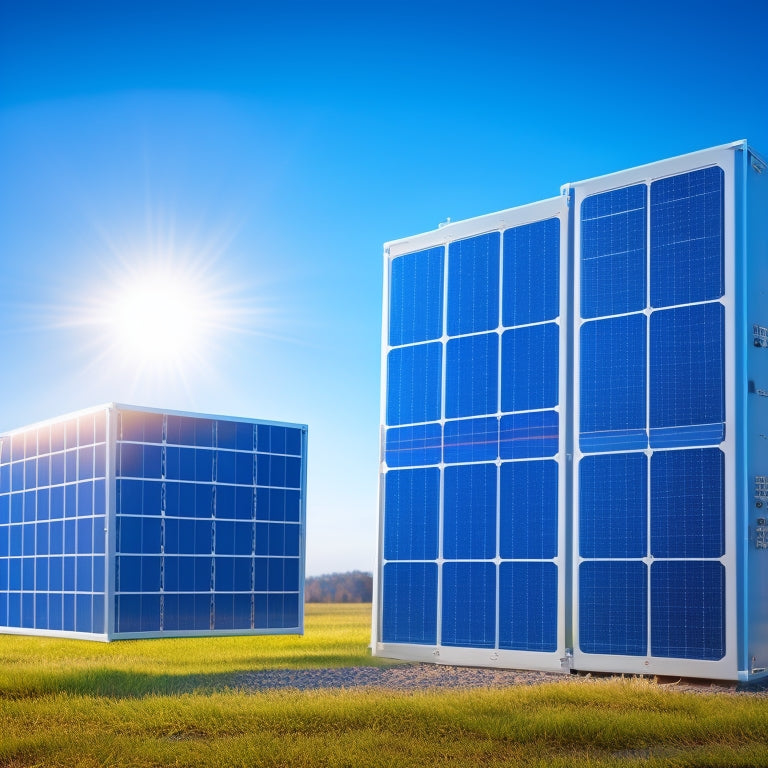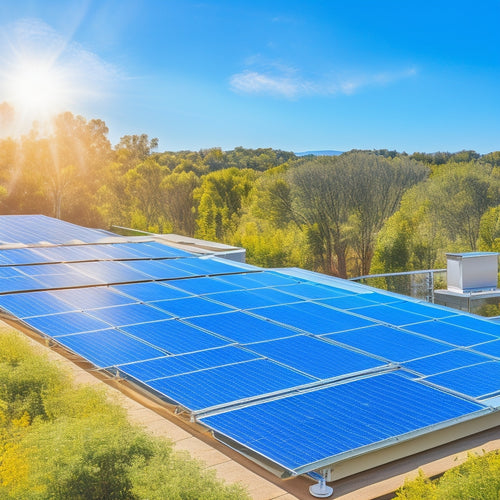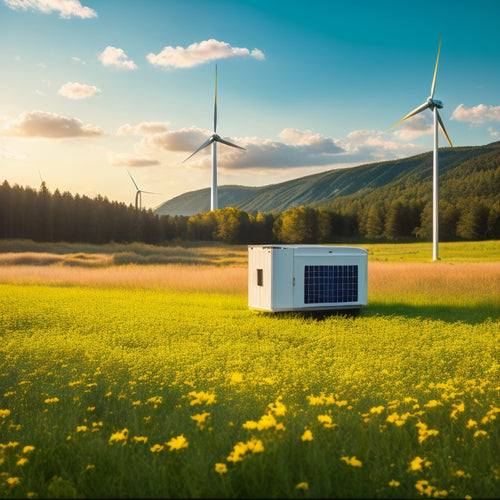
Solar Power Storage Systems
Share
With solar power storage systems, you can now break free from reliance on traditional grid systems and enjoy a continuous power supply, even during outages, while potentially achieving zero energy bills. By accurately evaluating your daily energy consumption and understanding your energy demands, you can effectively design and size your system for peak performance. Inspecting deep cycle battery types, such as lead-acid, lithium-ion, and nickel-cadmium, is essential for maximum efficiency and lifespan. Now that you've got the basics covered, you're ready to investigate how to fully utilize the benefits of solar power storage systems.
The Essentials
- Solar power storage systems enable energy independence and self-sufficiency by generating and storing renewable energy.
- Accurate sizing of solar power storage systems relies on evaluating daily energy consumption to meet specific energy needs.
- Selecting the right battery type, such as lithium-ion or lead-acid, is crucial for optimal system performance and longevity.
- Proper maintenance, including temperature monitoring, extends battery life and ensures a consistent electricity supply.
- Solar power storage systems provide a continuous power supply during outages, reducing reliance on the grid and maximizing savings.
Renewable Energy Independence Now
You're now on the path to energy self-sufficiency, free from the constraints of the grid.
With a solar power storage system, you can generate and store your own renewable energy, reducing your reliance on external power sources.
By utilizing excess energy generated by your solar panels during the day, you'll have a backup power supply for nighttime use or during power outages, thanks to home solar power battery storage solutions.
Energy Self-Sufficiency Now
With renewable energy technologies advancing at an extraordinary rate, achieving energy self-sufficiency has become a tangible reality. You can now break free from reliance on the grid and take control of your energy needs. Energy autonomy is no longer a distant dream, but a feasible goal that can be achieved through the integration of solar power storage systems.
By investing in renewable energy, you're not only reducing your carbon footprint but also gaining independence from fossil fuels. Sustainable living is now a practical choice, and you can reap the benefits of energy self-sufficiency.
| Benefits | Description |
|---|---|
| Reduced Energy Costs | Lower your energy bills and save money |
| Increased Energy Security | Rely less on the grid and enjoy uninterrupted power |
| Environmental Sustainability | Reduce your carbon footprint and contribute to a cleaner environment |
With energy storage systems, you can store excess energy generated by your solar panels during the day and use it at night or during power outages. This means you can enjoy continuous power, even when the grid is down. Achieve energy self-sufficiency now and join the ranks of those who have taken control of their energy needs.
Free From Grid Constraints
Since the advent of renewable energy technologies, the notion of being tied to the grid has become an outdated concept. You now have the power to break free from grid constraints and enjoy renewable energy independence.
With solar power storage systems, you can capture the energy of the sun and store it for later use, reducing your reliance on the grid. By leveraging lithium ion batteries, you can guarantee a reliable source of power even during outages, and minimize the environmental impact of traditional power consumption.
Off-grid solutions are now a reality, thanks to advancements in sustainable technology. You can generate your own electricity and store it in batteries, providing you with a dependable source of power even during outages.
This means you're no longer at the mercy of the grid, with its fluctuating prices and unreliable service.
Zero Energy Bills Guaranteed
You've achieved energy independence with your solar power storage system, which means you're generating enough electricity to power your home or business.
By utilizing efficient and durable residential solar panels, you're not only reducing your carbon footprint but also maximizing your energy efficiency renewable energy systems.
Now, you're ready to take the next step: enjoying zero cost electricity.
With your system, you'll be able to offset your energy consumption, resulting in zero energy bills, guaranteed.
Energy Independence Achieved
Tap into the full potential of solar power storage systems and break free from the grid - achieving energy independence has never been more within reach. By utilizing the power of the sun and storing excess energy in advanced batteries, you'll be able to generate your own electricity and reduce your reliance on the grid.
With solar power storage systems, you'll enjoy consistent and stable power supply, even during outages or peak hours. You'll also benefit from solar incentives, such as tax credits and rebates, which can greatly reduce the upfront cost of your system.
Additionally, regular battery upgrades guarantee your system remains efficient and effective, maximizing your energy independence. With a well-designed solar power storage system, you'll be able to monitor and control your energy usage in real-time, making adjustments as needed to optimize your energy independence.
Zero Cost Electricity
Achieving energy independence with solar power storage systems opens the door to a fresh chapter of cost savings, where you can enjoy zero cost electricity and bid farewell to hefty energy bills. With the right combination of solar incentives and energy policies, you can capitalize on the benefits of renewable energy. However, it's crucial to evaluate the environmental impact of your energy choices.
| Benefit | Description |
|---|---|
| Reduced Energy Bills | Zero cost electricity means no more hefty energy bills |
| Increased Energy Independence | You're no longer reliant on the grid for your energy needs |
| Environmental Benefits | Solar power reduces your carbon footprint and contributes to a cleaner environment |
| Improved Energy Efficiency | Smart meters and advanced storage technologies optimize your energy usage |
| Long-term Savings | Solar forecasts and cost analysis guarantee you're making an informed investment |
Deep Cycle Battery Options
You're now evaluating deep cycle battery options for your solar power storage system, and it's important to compare different battery types to determine the best fit for your needs.
You'll want to take into account factors such as lead-acid, lithium-ion, and nickel-cadmium batteries, each with their own strengths and weaknesses.
When selecting a deep cycle battery, it's vital to assess the specific requirements of your off-grid home or renewable energy system, such as reliable power storage and consistent electricity supply.
As you make your decision, you'll also need to take into account the expected lifespan of each battery type, ranging from 5 to 15 years or more, depending on the specific technology and usage patterns.
Battery Type Comparison
Your solar power storage system's performance heavily relies on the type of deep cycle battery you choose. When comparing lithium and lead acid batteries, it's crucial to evaluate their advantages and drawbacks.
Lithium batteries boast higher battery efficiency, with a capacity comparison showing they can store more energy per pound. They also offer more charging cycles, resulting in a longer lifespan. However, their higher cost is a significant factor.
Lead acid batteries, on the other hand, are more affordable upfront but have lower efficiency and a shorter lifespan. Their drawbacks also include a larger environmental impact due to the lead content.
When conducting a cost analysis, assess the overall cost of ownership, including maintenance requirements and installation considerations. Technology advancements have improved lithium batteries, making them a more viable option.
Ultimately, analyzing the pros and cons of each will help you make an informed decision for your solar power storage system.
Battery Life Expectancy
When selecting a deep cycle battery for your solar power storage system, one vital consideration is the battery's life expectancy, which greatly influences the overall system's performance and cost-effectiveness.
You'll want to choose a battery that can withstand the demands of repeated charging cycles, as this directly impacts its lifespan. Proper battery maintenance, such as monitoring temperature and state of charge, is essential in extending its life.
Technology advancements have led to improved battery designs with reduced environmental impact. However, this comes at a cost, and you'll need to weigh the benefits against your budget.
Consider the warranty options and performance metrics provided by the manufacturer to guarantee you're getting the best value. Installation tips, such as avoiding deep discharging, can also help prolong the battery's life.
A lifecycle analysis will help you understand the battery's overall cost-effectiveness, including recycling methods at the end of its life. By carefully evaluating these factors, you can make an informed decision and enjoy the freedom and independence that comes with a reliable solar power storage system.
Assess Your Energy Demands
You need to determine your daily energy consumption to size your solar power storage system accurately. This involves calculating your total daily energy usage in watt-hours (Wh) to guarantee your system can meet your energy demands.
With a renewable energy storage solution, you can maximize your energy savings solar energy storage and reduce your reliance on the grid. Identifying your energy usage patterns, such as peak usage times and standby power requirements, is also essential to designing an efficient system.
Daily Energy Consumption
Evaluating daily energy consumption is an important step in designing an effective solar power storage system. You need to understand your energy demands to determine the right size of your solar power storage system. To do this, you'll need to assess your daily energy consumption in kilowatt-hours (kWh). This will help you identify areas where you can improve energy efficiency and optimize your energy usage.
You can start by tracking your energy consumption over a period of time, ideally a year, to account for seasonal variations. Make a list of all your appliances, lighting, and devices, and their corresponding power ratings. Then, estimate how many hours each appliance is used daily. This will give you an idea of your total daily energy consumption.
Effective load management is vital in optimizing your energy usage. Identify areas where you can reduce energy consumption, such as replacing incandescent bulbs with LEDs or using energy-efficient appliances.
Energy Usage Patterns
Understanding your energy usage patterns is essential in evaluating your energy demands. To assess your energy needs accurately, you need to identify the times of day when your energy consumption is highest. This information will help you determine the required capacity of your solar power storage system.
You can analyze your energy usage patterns by monitoring your daily energy consumption over a period of time. This will provide significant revelations into your energy usage habits, helping you identify areas where you can optimize energy usage.
Energy forecasting models can also be used to predict your energy demands based on historical data and weather patterns. This information can be used to optimize your energy usage and reduce your reliance on the grid.
Longer Lifespan Than Generators
You'll find that solar power storage systems offer extended battery life, with some batteries lasting up to 15 years or more.
This means you won't need to replace them as frequently as generators, which typically have a shorter lifespan.
As a result, you'll enjoy reduced maintenance costs and fewer replacement hassles over the long term.
Extended Battery Life
A solar power storage system's battery life is a vital factor in its overall performance and cost-effectiveness, with a longer lifespan translating to reduced replacement costs and increased reliability.
You want to guarantee you get the most out of your battery, and that means understanding how to maintain it properly. By following simple battery maintenance tips, you can greatly extend the life of your solar power storage system's battery.
For instance, keeping your battery at room temperature (between 60°F and 80°F) can help prevent degradation. Additionally, avoiding deep discharges and making sure your battery is fully charged before storage can also contribute to its longevity.
Optimal charging techniques are also important in prolonging your battery's life. You should avoid overcharging, as this can cause damage to the battery cells.
Instead, use a smart charger that can detect the battery's state of charge and adjust the charging voltage accordingly.
Frequently Asked Questions
Can I Install a Solar Power Storage System Myself?
You can attempt a DIY installation, but be aware that it's essential to prioritize safety considerations, as improper connections can be hazardous, and it's recommended to consult a licensed electrician to guarantee a secure and efficient setup.
Are Solar Power Storage Systems Environmentally Friendly?
You're fundamentally hugging the planet by choosing solar power storage systems, which boast a remarkably low carbon footprint! Through lifecycle analysis, you'll find that even battery recycling is accounted for, ensuring a guilt-free, eco-friendly energy experience that liberates you from fossil fuels.
Do Solar Power Storage Systems Work During Power Outages?
When the grid goes down, you'll be glad you invested in a solar battery, providing backup power during outages, so you can keep your lights on, fridge running, and stay connected, no matter what's happening outside.
How Often Should I Maintain My Solar Power Storage System?
You should establish a regular maintenance schedule to guarantee your system's peak performance, as neglecting upkeep can reduce battery lifespan; aim for quarterly checks and annual thorough examinations to keep your energy freedom intact.
Are Government Incentives Available for Solar Power Storage Systems?
You're likely eligible for government incentives, like federal rebates and state incentives, which can greatly reduce the upfront cost of your solar power storage system, giving you more freedom to invest in renewable energy.
Final Thoughts
As you utilize the power of solar energy, you're not just cutting ties with the grid, you're building a fortress of independence, much like the self-sufficient utopia envisioned by Henry David Thoreau in Walden. With a reliable solar power storage system, you're guaranteed zero energy bills and a longer lifespan than generators. By evaluating your energy demands and choosing the right deep cycle battery options, you'll be well on your way to a future where the only shock is how much you're saving.
Related Posts
-

How to Achieve a Zero-Waste Lifestyle for a Greener Tomorrow
To achieve a zero-waste lifestyle, start by adopting the principles of refusing, reducing, reusing, and recycling. Sw...
-

What Types of Solar Energy Devices Are Available
You'll find several types of solar energy devices available today, each customized to different energy needs. Photovo...
-

Sustainable and Eco-Friendly Generators for a Reduced Carbon Footprint
Sustainable and eco-friendly generators are perfect for cutting your carbon footprint and increasing energy efficienc...


